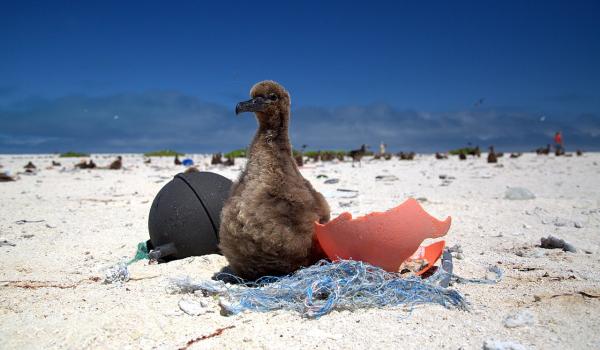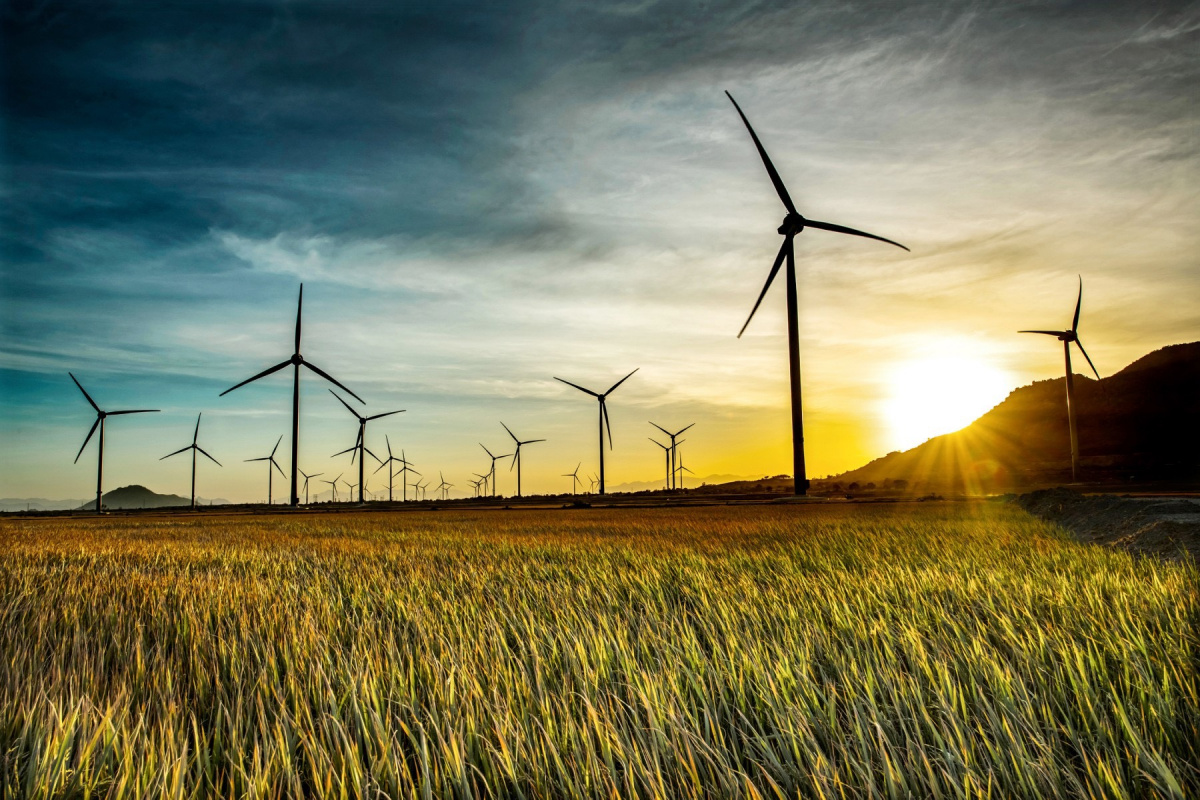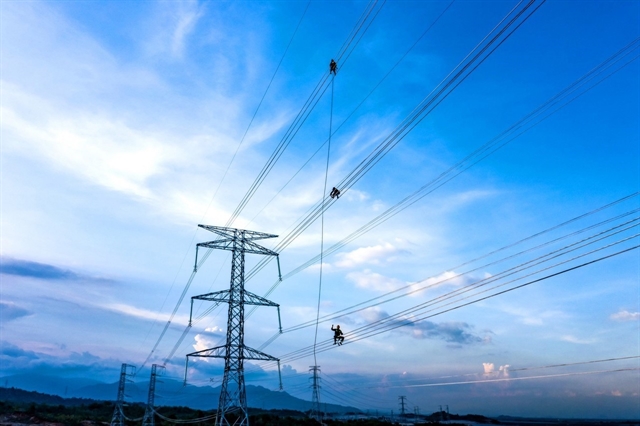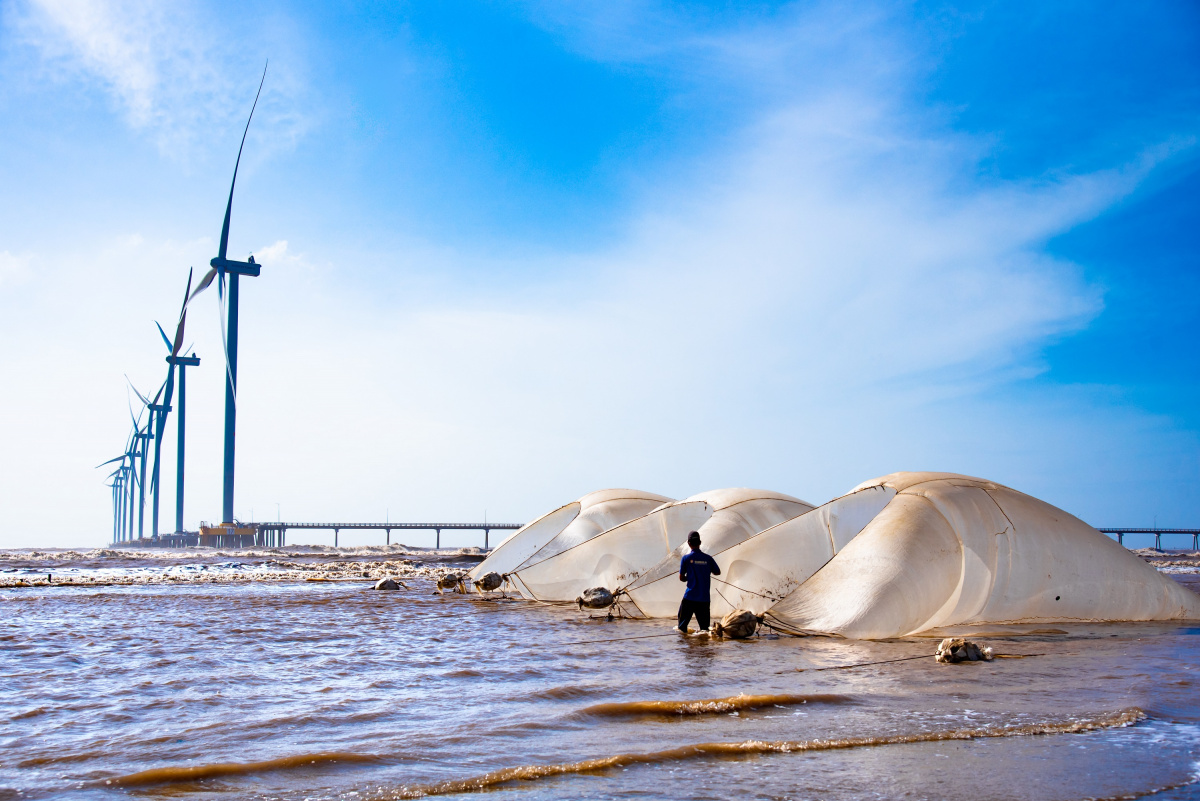UNEA Resolution - ‘End Plastic Pollution’ - and IUCN role in implementation of the Treaty
The new UNEA Resolution, ‘End Plastic Pollution: Towards a legally binding instrument’, establishes an Intergovernmental Negotiating Committee that will develop the specific content of the new plastic pollution treaty with the aim of completing its work by the end of 2024. The future is ours to improve, and this news from UNEA provides a strong message of hope that we can indeed eliminate plastic pollution from our environment with a multi-pronged approach and international cooperation.

Photo: NOAA
Addressing a global-scale problem
Rapidly increasing levels of plastic pollution represent a serious problem at a global scale, negatively impacting the environmental, social and economic dimensions of sustainable development. The majority of marine plastic pollution comes from land-based sources, including urban and storm runoff, sewer overflows, beach visitors, inadequate waste disposal and management, industrial activities, construction, and illegal dumping. The main ocean-based sources of plastic pollution are the fishing industry, nautical activities, and aquaculture.
IUCN welcomes the Resolution
For nearly a decade, IUCN has worked on the problem of marine plastic pollution. IUCN welcomes the move toward an international legally binding instrument on plastic pollution made by Heads of State, Ministers of environment and other representatives from 175 nations that gathered in Nairobi, Kenya, at the resumed fifth session of the United Nations Environment Assembly on the 2nd March 2022.
The UN member states decided that the following elements should be considered in developing the new treaty:
- Global objectives to tackle plastic pollution in marine and other environments and its impacts
- Global obligations and measures along the full lifecycle of plastics, including on product design, consumption and waste management
- A mechanism for providing policy-relevant scientific information and assessment
- A mechanism for providing financial support to the treaty implementation
- National and international cooperative measures
- National action plans and reporting towards the prevention, reduction and elimination of plastic pollution
- Treaty implementation progress assessment
The Resolution recognises that plastic pollution constitutes a threat to all environments and poses risks to human health, and very importantly, the role of the private sector, and all stakeholders, in developing and implementing the treaty, and emphasises that the problem should be solved through measures along the entire life cycle of plastics, from extraction of raw materials to legacy plastic pollution. A mechanism is included for directing finance to nations to enable the agreement implementation. This can enable countries to implement plastic waste management systems across the life cycle by improving waste collection, building recycling plants, or eliminating the open burning of plastic.
Since UNEA-1 back in 2014, the global community has come a long way engaging to find solutions to address plastic pollution. The sustained multi-year focus on plastics has laid the foundation for where we are today, importantly highlighting that the current global governance framework is broken to get us out of the current plastics crisis. This background laid the ground for the positive mood and outlook around a global plastics governance instrument.
Peter Manyara, Program Manager, Coastal and Ocean Resilience, IUCN ESARO
The Resolution highlights marine plastic pollution
The Resolution specifies concern over the specific impacts of plastic pollution, that it can be of a transboundary nature, and needs to be tackled with a full lifecycle approach.
It also emphasises the urgent need to strengthen the science-policy interface at all levels, improve understanding of the global impact of plastic pollution on the environment, and promotes effective and progressive actions at the local, regional and global level, recognizing the important role of plastics for society.
While the Resolution identifies a number of issues that will be addressed, to comprehensively tackle plastic pollution will require additional actions during the dialogues. In Science, 2 July 2021, IUCN’s Joao Sousa as a contributing author noted three goals to anchor a solid agreement with action at its core. These are only partially seen in the Resolution:
- Minimise virgin plastics production and consumption – and 2. Facilitate safe circularity of plastics – these are simply noted in part as, [T]o promote sustainable production and consumption of plastics, including, among others, product design, and environmentally sound waste management, including through resource efficiency and circular economy approaches;
- Eliminate plastic pollution in the environment – this is specifically referred to as, [T]he urgent need to strengthen global coordination, cooperation and governance to take immediate actions towards the long-term elimination of plastic pollution, in marine and other environments, and of avoiding detriment from plastic pollution to ecosystems and the human activities dependent on them and also [T]o promote national action plans to work towards the prevention, reduction and elimination of plastic pollution, and to support regional and international cooperation.
The Resolution underlines the importance of promoting sustainable design of products and materials so that they can be reused, remanufactured or recycled and therefore retained in the economy for as long as possible. This includes the resources they are made of, as well as minimising the generation of waste, which can significantly contribute to sustainable production and consumption of plastics.
The economic cost
Four recent economic assessments by IUCN (2021) support the rationale of addressing the economic cost of plastic pollution detailed in the Resolution. Plastic pollution affects fisheries directly through damage to boats, plastic in fishnets and the impact of Abandoned, Lost of Discarded Fishing Gear (ALDFG). Direct and indirect impacts on marine ecosystems and marine biodiversity – through ghost fishing for example – amplify the negative effects of plastic pollution. Overall, marine plastic pollution plays a crucial role in marine ecosystem degradation and the services these ecosystems provide. This is not only a problem for the fisheries sector, but can impact other sectors of the economy, such as potential losses to the tourism sector or increased costs of beach clean-ups to avoid these losses.
Policy and economic guidance
Policy and economic guidance are integral to addressing this complex problem. IUCN’s in-depth analyses of regulatory tools such as Extended Producer Responsibility to identify gaps and facilitate the exchange of best practices are being cross-linked with the on-going scientific and economic research to show how to intervene, and at which points, to generate the most effective actions.
This work is now newly energised with the UNEA5.2 Resolution, and it is also beneficial for the support it gives to an IUCN World Conservation Congress outcome: the Union’s Resolution 019 that calls for stopping the global plastic pollution crisis in marine environments by 2030.
| Resolution: Legally binding instrument provisions proposed |
IUCN’s work on plastics: Value Addition to supporting the Resolution’s aims |
|---|---|
|
(b) To promote sustainable production and consumption of plastics, including, among others, product design, and environmentally sound waste management, including through resource efficiency and circular economy approaches; |
Close the Plastics Tap knowledge products and reports MARPLASTICCs’ Circular Economy projects |
|
(c) To promote national and international cooperative measures to reduce plastic pollution in the marine environment, including existing plastic pollution; (d) To develop, implement and update national action plans reflecting country-driven approaches to contribute to the objectives of the instrument; (e) To promote national action plans to work towards the prevention, reduction and elimination of plastic pollution, and to support regional and international cooperation; (f) To specify national reporting, as appropriate; |
Plastic Waste Free Islands – Caribbean, Oceania, and Mediterranean (8 islands: Republic of Cyprus, Menorca, Fiji, Samoa, Vanuatu, Antigua and Barbuda, Grenada, and St Lucia). Regional cooperation. 8 pilots: National Plastic Pollution Hotspotting and Shaping Action reports (Kenya, Mozambique, South Africa, Thailand and Viet Nam, Cyprus, Menorca, and Tanzania))
PlastiCoCo National Plastic Pollution reporting - Tanzania
Close the Plastics Tap knowledge products and reports |
|
(g) To periodically assess the progress of implementation of the instrument;
(h) To periodically assess the effectiveness of the instrument in achieving its objectives; (i) To provide scientific and socio-economic assessments related to plastic pollution; |
National reports as above, plus the work of IUCN on Extended Producer Responsibility (EPR), national plastics policies, and The economic impacts of plastic pollution. |
|
(j) To increase knowledge through awareness-raising, education and information exchange; (k) To promote cooperation and coordination with relevant regional and international conventions, instruments and organizations, while recognizing their respective mandates, avoiding duplication, and promoting complementarity of action; |
Close the Plastic Tap programme overall Tutorials and Trainings on Methodologies and Guidance (with UNEP) for plastic pollution hotspotting – and creation of priority interventions to address the issues at national and regional levels |
| (l) To encourage action by all stakeholders, including the private sector, and to promote cooperation at the global, regional, national and local levels; | Alternate Value Chains as noted in the Plastic Waste Free Islands project and Business Engagement |
| (m) To initiate a multi-stakeholder action agenda; | Close the Plastic Tap programme overall |
| (n) To specify arrangements for capacity-building and technical assistance, technology transfer on mutually agreed terms, and financial assistance, recognizing that the effective implementation of some legal obligations under the instrument is dependent on the availability of capacity building and technical and adequate financial assistance; |
Tutorials and Trainings on Methodologies and Guidance (with UNEP) for plastic pollution hotspotting – and creation of priority interventions to address the issues at national and regional levels Alternate Value Chains as noted in the Plastic Waste Free Islands project |
IUCN supports these representative, open negotiations
IUCN supports the fact that the Plastics Treaty negotiations are representative of all stakeholders, and they are open. This aligns with IUCN's approach to supporting complex environmental negotiations by open discussion and collaboration, holding to the principles of fairness and equity.
More information
The draft UNEA Resolution text can be found here: UNEA Resolution



